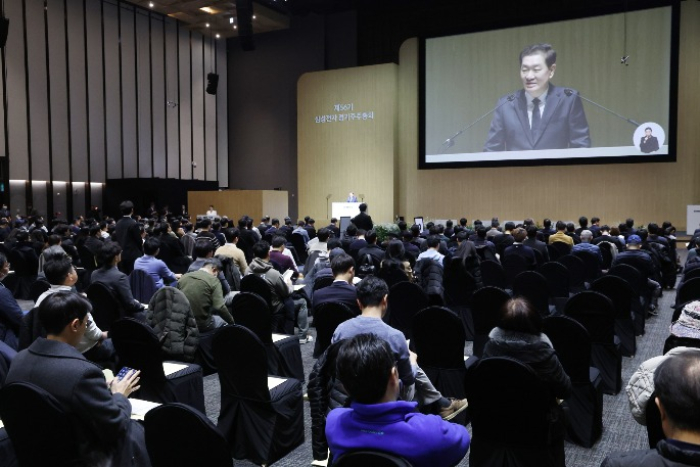Samsung to expand in robotics, medtech; eyes sizeable M&As
It vows not to repeat last year's missteps with HBM3 in the HBM4 and customized HBM markets
By Mar 19, 2025 (Gmt+09:00)
LG Chem to sell water filter business to Glenwood PE for $692 million


KT&G eyes overseas M&A after rejecting activist fund's offer


Kyobo Life poised to buy Japan’s SBI Group-owned savings bank


StockX in merger talks with Naver’s online reseller Kream


Meritz backs half of ex-manager’s $210 mn hedge fund



Samsung Electronics Co. will accelerate its push into robotics, medical technology and next-generation semiconductor markets to secure new growth drivers, for which it is pursuing "meaningful" M&As, its Chief Executive Han Jong-hee said on Wednesday.
In opening remarks at its annual general meeting, Han apologized for falling behind in the AI chip race and underperforming in the home appliance sectors.
"We will continue to take on new challenges in various fields, including robotics, medtech and next-generation semiconductors," Han said at the gathering attended by about 800 shareholders, up from 600 last year.
He did not provide details about its strategy for the new business areas.
His remarks came after Samsung became the largest shareholder of Rainbow Robotics Co., a domestic collaborative robot maker, with a 35% stake.
However, the South Korean tech giant has not pulled off sizeable acquisitions over the past few years.
"We are fully aware that M&As are crucial for securing new growth engines," said Han, in response to a shareholder's question about the absence of large-scale M&A deals.
"This year, we will actively pursue more meaningful M&A opportunities and do our best to deliver tangible results," he added.

At the shareholder meeting, Samsung's top management faced criticism over its stagnant share price, especially in comparison with local rival SK Hynix Inc., a pioneer in the high-bandwidth memory (HBM) AI chip market.
"Last year, we failed to respond effectively to the evolving AI semiconductor market, and did not achieve overwhelming market competitiveness in key products such as smartphones, TVs and home appliances,” said Han, who chaired the meeting.
In 2024, the company delivered worse-than-expected results on the back of the steady DRAM price declines, HBM chip supply delays, a slowdown in demand for enterprise solid state drives (eSSDs) and increased losses in its foundry business.
“In HBM4 and customized HBM markets, we’ll ensure that our missteps with HBM3 last year will not be repeated,” Jun Young-hyun, vice chairman and head of Samsung Electronics’ Device Solutions (DS) division, told shareholders.
Jun noted that it will produce 12-layer HBM3E chips as early as the second quarter, or by the second half at the latest.
WIDENING GAP
SK Hynix is further widening its gap with Samsung. On Wednesday, SK Hynix said it has delivered the first samples of 12-layer HBM4, the world’s most advanced AI chip and the sixth generation of HBM, to its customers for quality evaluation six months earlier than its original timeline.
Lee Jae-yong, chairman of Samsung Electronics, has warned that the company has lost its characteristic "relentless" Samsung Spirit, calling on senior executives to overcome the current crisis with a "do-or-die" attitude in a message shared during the group's recent executive seminars.
Its share price has advanced 9.55% to 58,500 won year to date, lagging behind SK Hynix, which has gained 20.04% to 205,500 won over the same period.
Write to Jeong-Soo Hwang at hjs@hankyung.com
Yeonhee Kim edited this article.
-
 Korean chipmakersSK Hynix ships world’s first 12-layer HBM4 samples early
Korean chipmakersSK Hynix ships world’s first 12-layer HBM4 samples earlyMar 19, 2025 (Gmt+09:00)
3 Min read -
 Leadership & ManagementSamsung in 'do or die' situation'; Lee sounds crisis alarm
Leadership & ManagementSamsung in 'do or die' situation'; Lee sounds crisis alarmMar 17, 2025 (Gmt+09:00)
2 Min read -
 EarningsSamsung to focus on HBM, other high-end chips after weak Q4 earnings
EarningsSamsung to focus on HBM, other high-end chips after weak Q4 earningsJan 31, 2025 (Gmt+09:00)
4 Min read -
 EarningsSK Hynix surpasses Samsung with record-high profit in Q4
EarningsSK Hynix surpasses Samsung with record-high profit in Q4Jan 23, 2025 (Gmt+09:00)
2 Min read -
 Korean chipmakersSK Hynix sharply narrows gap with Samsung’s market cap
Korean chipmakersSK Hynix sharply narrows gap with Samsung’s market capJan 22, 2025 (Gmt+09:00)
3 Min read -

-
 RoboticsSamsung joins humanoid robots race with larger stake in Rainbow Robotics
RoboticsSamsung joins humanoid robots race with larger stake in Rainbow RoboticsDec 31, 2024 (Gmt+09:00)
3 Min read -
 Korean chipmakersSK Hynix to produce HBM4 on 3 nm foundry process in 2025
Korean chipmakersSK Hynix to produce HBM4 on 3 nm foundry process in 2025Dec 03, 2024 (Gmt+09:00)
2 Min read -
 Shareholder valueSamsung Electronics to buy back $7.2 bn in shares
Shareholder valueSamsung Electronics to buy back $7.2 bn in sharesNov 17, 2024 (Gmt+09:00)
2 Min read -
 Korean chipmakersNvidia asks SK Hynix to bring forward HBM4 supply by 6 months
Korean chipmakersNvidia asks SK Hynix to bring forward HBM4 supply by 6 monthsNov 04, 2024 (Gmt+09:00)
2 Min read -
 Korean chipmakersSK Hynix, Samsung to cut legacy DRAM output as Chinese firms catch up
Korean chipmakersSK Hynix, Samsung to cut legacy DRAM output as Chinese firms catch upNov 01, 2024 (Gmt+09:00)
4 Min read -
 EarningsSamsung chip head vows drastic revamp after flagging weak Q3 earnings
EarningsSamsung chip head vows drastic revamp after flagging weak Q3 earningsOct 08, 2024 (Gmt+09:00)
4 Min read -
 Korean chipmakersSamsung tipped to supply HBM3 to Nvidia for Chinese market
Korean chipmakersSamsung tipped to supply HBM3 to Nvidia for Chinese marketJul 24, 2024 (Gmt+09:00)
2 Min read


